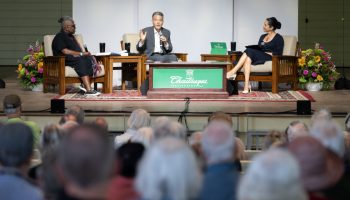
At 10:45 a.m. today in the Amphitheater, Michael O’Hanlon and Kori Schake will discuss world affairs and the global order through the lens of U.S. defense and diplomacy, continuing Week Four’s theme “The Future of the American Experiment: A Week in Partnership with American Enterprise Institute and Brookings Institution.”
O’Hanlon graduated with a doctorate from Princeton University in public and international affairs. Currently, he holds the inaugural Philip H. Knight Chair in Defense and Strategy. He’s a director of research in the Foreign Policy program at the Brookings Institution, an adjunct professor at both Georgetown University and Columbia University and a member of the Pentagon’s Defense Policy Board.
Schake is a senior fellow and the director of foreign and defense policy studies at American Enterprise Institute, and a frequent Chautauqua speaker. Before AEI, Schake worked as the deputy director-general of the International Institute for Strategic Studies in London. Her role in government spanned from working in the U.S. State Department, National Security Council at the White House and as a senior policy adviser to the McCain-Palin 2008 presidential campaign.
During today’s lecture, O’Hanlon looks to discuss President Donald Trump and his administration’s role in defense and diplomacy.
“I thought a fun way might be for each of us, who disagree with Trump, to talk about any issues where each of us agree with him, or at least feel partially encouraged by some of what we’re seeing,” said O’Hanlon. “That would create an interesting combination of perspectives that are both concerned but also hopeful, and how to proceed from there.”
While a critic of the Trump Administration, O’Hanlon has found policies he has agreed with as well as those he finds shocking. He views Trump as an unprecedented president, relative to anyone in office since 1945.
“Trump seemed like he wasn’t very interested in alliance or free trade,” said O’Hanlon. “However, there’s a slight modification to what I’ve seen from the first six months.”
Trump has seemed far less disruptive on the matter of alliances, according to O’Hanlon. He isn’t breaking off military alliances or pulling back on international U.S. military forces.
“He is quite disruptive on economic policy, but not quite as much on security policy compared to any president since the Cold War,” said O’Hanlon.
He compared Trump’s economic policy to that of the 1920s Republicans. However, O’Hanlon doesn’t predict the economic collapse that resulted 100 years ago.
“I’ve heard it said about President Trump, by people who know him, that he’s very willing to take risks,” said O’Hanlon. “But he’s also got a survival instinct. He clearly follows the stock market, the unemployment rate and the inflation rate as important barometers as measures of his own success.”
While there may not be the same economic collapse, a high rate of inflation and a “slowdown in global economic cooperation” may be the price Americans pay for a Trump economy, according to O’Hanlon.
While the economy may dip, O’Hanlon hopes that America can keep up with global competitors in technological warfare advancements.
“Not to sound too cliche, but I think it’s true that the degree which we use robotic and artificial intelligence in new and innovative ways will be a lot of what determines the future of not just warfare, but preventing war,” O’Hanlon said.
These new technologies are on display in global conflicts already. The Russia-Ukraine war is seeing digital and artificial intelligence economies currently at play, especially through drone warfare.
“When you combine that with robotics, I think that’s the area of warfare changing the fastest right now,” O’Hanlon said.
With the development of new technologies, O’Hanlon hopes that these developments don’t draw further political polarization within the country.
“I think people will see the degree to which we really try to learn from each other and interact collegially with each other, even when we sometimes have slightly different world views,” said O’Hanlon. “It’s an exciting time to be involved in this conversation with my good friend, Kori Schake.”




